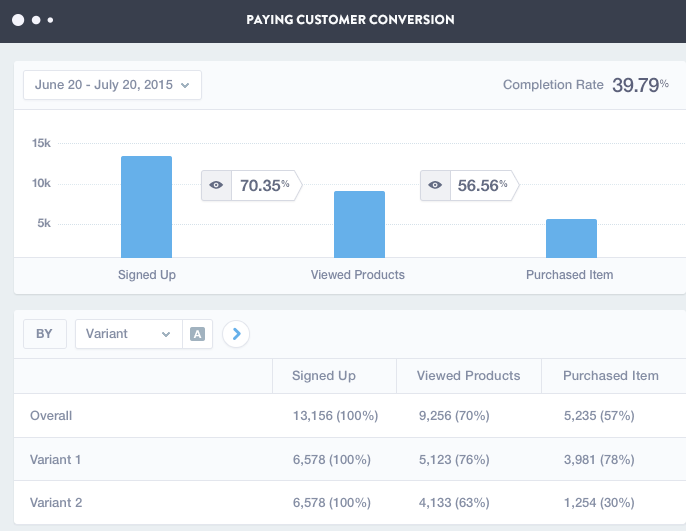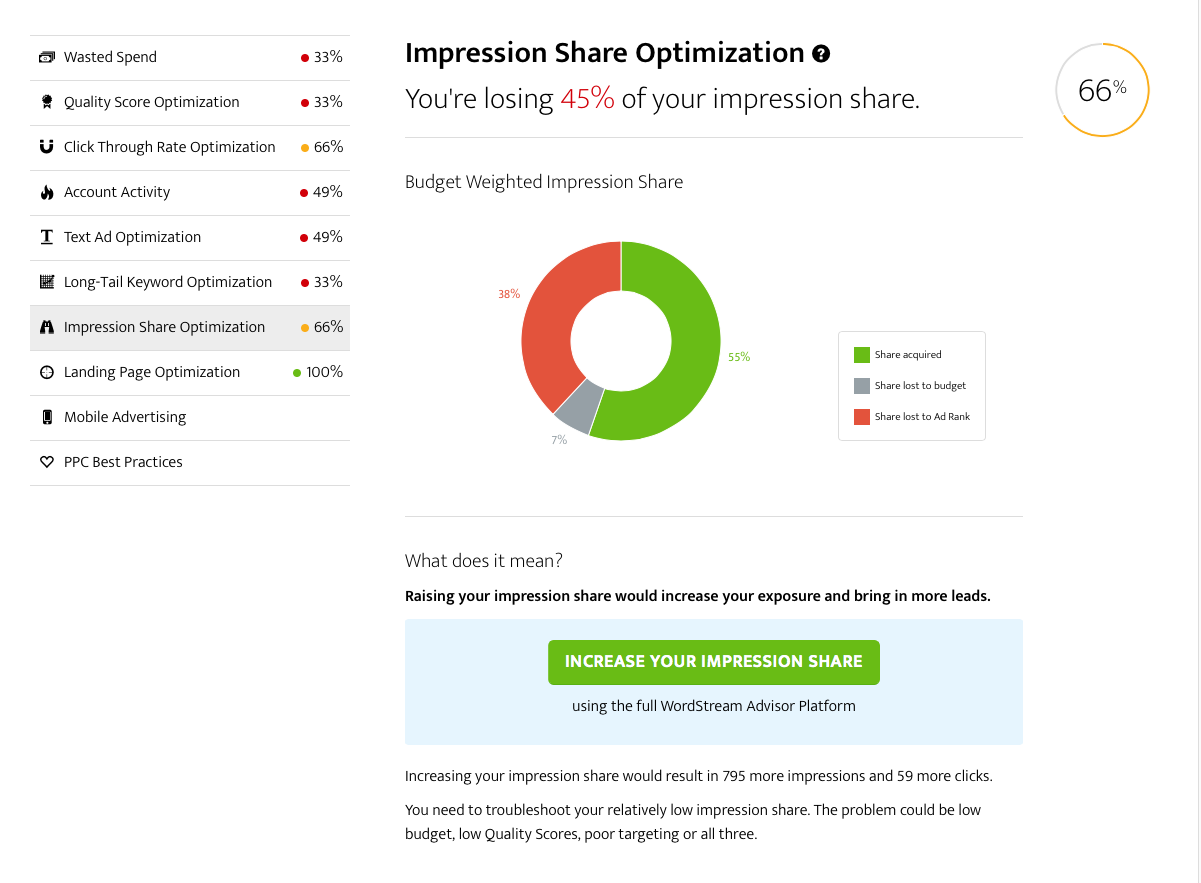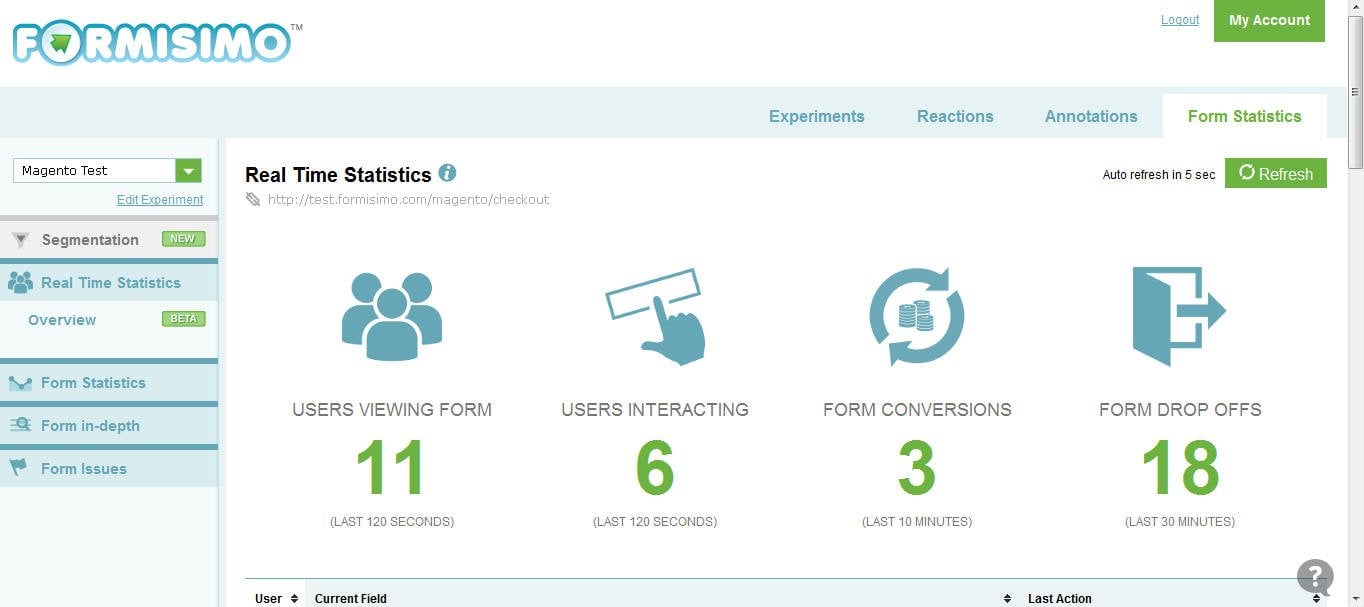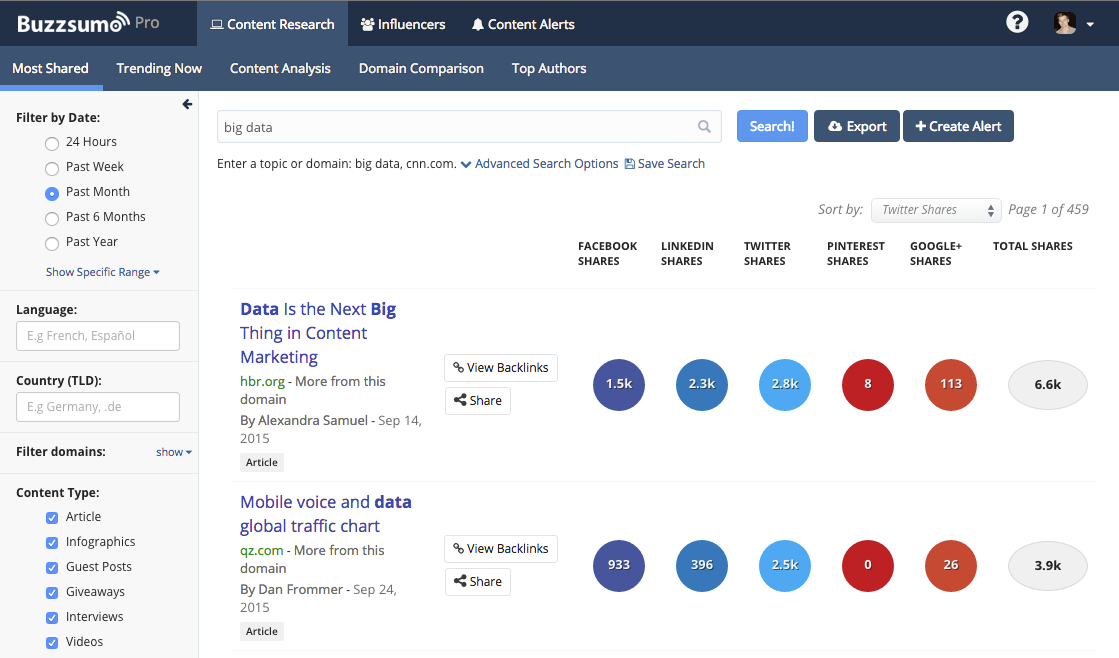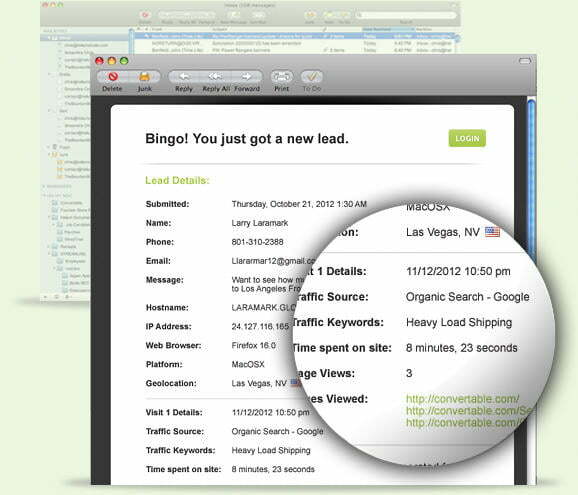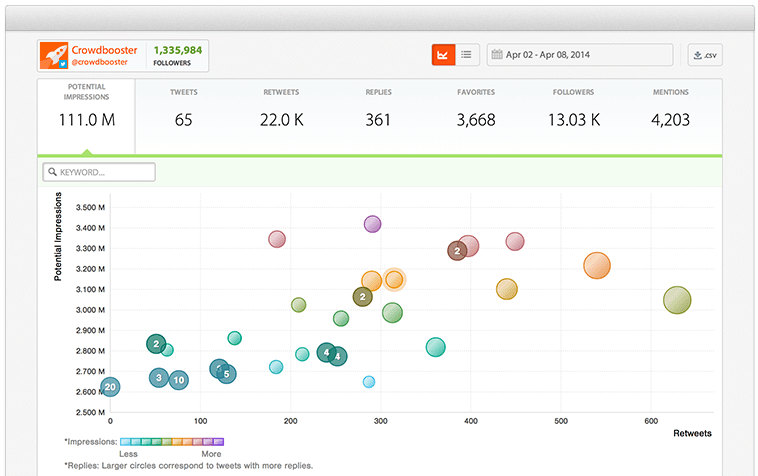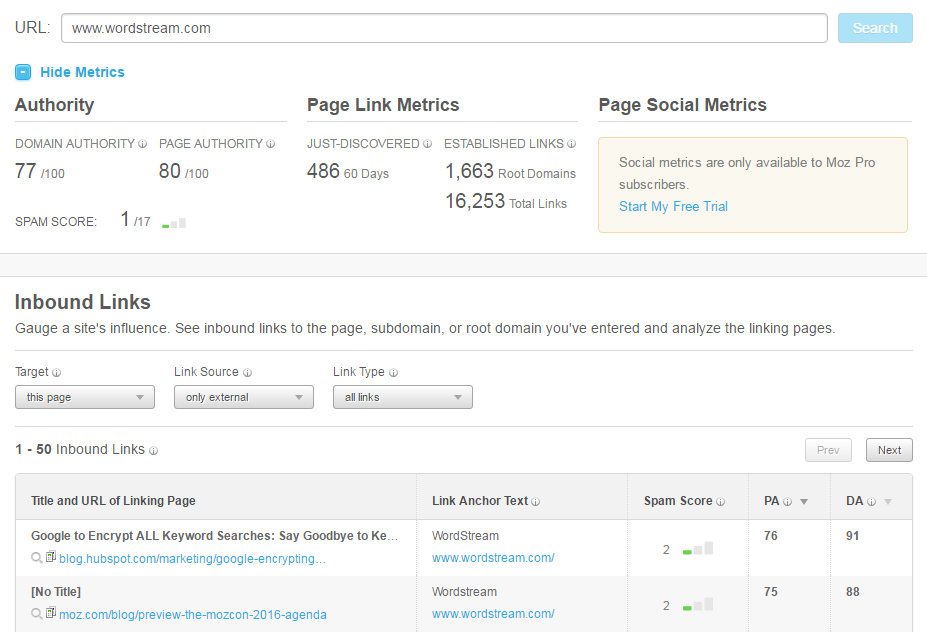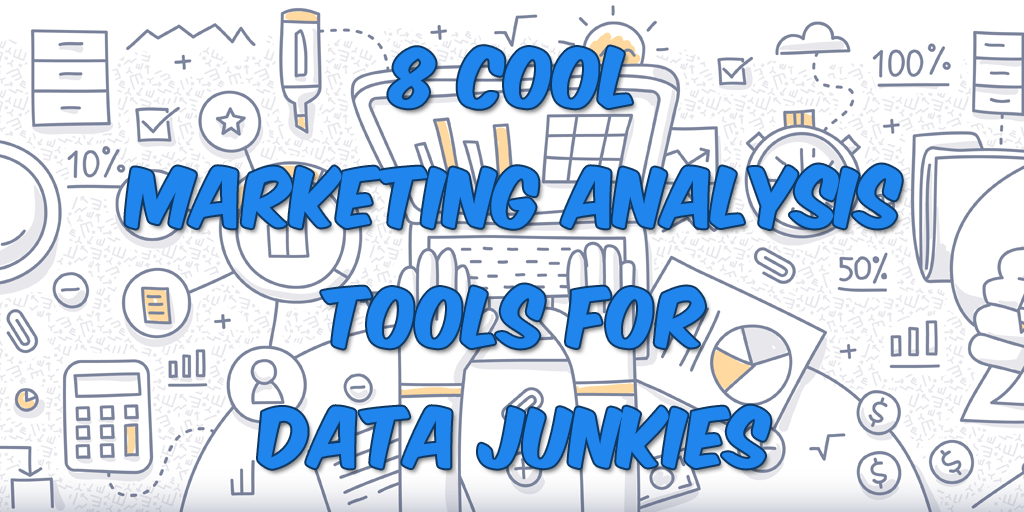
Data is every marketer’s best friend. Without data, we couldn’t identify what’s working well in our campaigns, diagnose potential problems, or decide upon which areas to focus our efforts. However, some data is more valuable than other data, and knowing which metrics to monitor can mean the difference between success and failure.
There are dozens (if not hundreds) of marketing analysis tools available to marketers of all disciplines. Some are free and do one thing really well, whereas others are subscription-based and offer a broad range of functionality. All of them promise the sweet, sweet data you need to run more effective campaigns, but which ones are worth your time?
In today’s post, we’ll be taking a look at eight marketing analysis tools to see what they do, who they’re for, and what they can offer you.
1. Mixpanel – Advanced Web and Mobile Analytics
First up in our list of marketing analysis tools is Mixpanel, a powerful suite of analytical tools that can offer invaluable insights into audience behavior.
Image via Mixpanel
What Does It Do?
Mixpanel offers users a wealth of information about how people use websites and mobile apps. You can monitor user interaction with your app or site as a whole, or drill down to individual buttons and features to see exactly how your users are interacting with your product. All of this functionality is possible without requiring a single line of code, meaning that even non-technical personnel can access important data about your site or app.
Who Is It For?
Mixpanel has some impressive clients, including Autodesk, Salesforce, and Twitch, but its competitive pricing (see below) puts it well within reach of even small businesses. Users with complex websites or mobile apps could potentially benefit greatly from the insights offered by Mixpanel.
How Much Does It Cost?
For analysis of up to 25,000 data points per month (a data point is any defined user action, such as clicking a button or taking a specific action on your site or app), Mixpanel is free. The monthly subscription changes depending on the volume of data being analyzed. Check the official pricing page for more details.
2. The AdWords Performance Grader – A Complete PPC Audit in 60 Seconds
PPC is a great way to reach new customers and grow your business, but to say there are a lot of variables that can determine your success would be an understatement. For those new to the world of paid search, even identifying the right areas to focus on can be overwhelming, which is why thousands of small-business owners and advertisers have turned to the AdWords Performance Grader for help. It’s essentially an agency-level PPC audit in 60 seconds.
What Does It Do?
The AdWords Performance Grader quickly and securely evaluates the strength of your Google Ads account (formerly known as AdWords) in 60 seconds or less. Once the Grader has performed its audit of your account, you’ll be presented with a detailed report showing the strengths and weaknesses of your account according to 10 key metrics, including mobile optimization, ad text optimization, and impression share.
This information allows you to zero in on the elements of your account that need the most work, offering a strong potential lift in immediate account performance.
Who Is It For?
Anyone with an active Google Ads account can benefit from the insights provided by the AdWords Performance Grader, from small businesses to mid-sized agencies.
How Much Does It Cost?
The AdWords Performance Grader is completely free to use. Grade your account for free today!
3. Formisimo – Insight into Web Form Abandonment
Web forms are an integral part of using the web, but their prevalence doesn’t make them any less of a challenge from a conversion perspective. That’s what makes Formisimo so potentially valuable to marketers.
What Does It Do?
Formisimo provides users with actionable data about why people fail to complete web forms. The software analyzes real-time data from your site and compiles intuitive reports according to analysis of your forms against 54 individual metrics. This level of insight can tell you which parts of your forms are deterring prospects from converting, among many other things.
Who Is It For?
Anyone whose website or app uses web forms can benefit from Formisimo. Similarly to Mixpanel, Formisimo is used by some of the web’s leading brands and sites, such as Toyota and Uber, but small businesses may benefit even more from the kind of actionable data promised by the software.
How Much Does It Cost?
Formisimo costs $50 per month for the “Startup” package, to $180 per month for agencies.
4. CrazyEgg – Heat Maps Done Right
There are few marketing analytics insights more valuable than heat map data. Seeing precisely where your users are focusing their attention on your site (among other uses) can provide marketers with remarkable insights into their audience’s behavior.
What Does It Do?
CrazyEgg tracks and analyzes user behavior on websites. It tracks which elements of a page users are interacting with, which creates a heat map visualization of this behavior over time. CrazyEgg can also measure the scroll depth of web pages, revealing at what point you begin to lose visitors’ attention. (This is one of the so-called “attention metrics”).
Another really cool feature of CrazyEgg is that it can tell you a great deal about where your clicks came from in the first place. In addition, you can augment your existing audience profile data with information from CrazyEgg, which can offer amazingly granular data and reporting, depending on the plan you opt for (more on this below).
Who Is It For?
If you want to stop guessing what your users are doing and start seeing actual data on what they’re doing, CrazyEgg is for you. Heat maps – and the decisions you can make based upon them – can have an immense impact on your conversion rates, as you can literally see what people are doing on your site, as well as revealing areas that are being ignored.
How Much Does It Cost?
Notably, all CrazyEgg plans are completely free for the first 30 days, which is pretty awesome. Beyond that point, CrazyEgg plans start at $9 per month (paid annually for an up-front one-time yearly payment of $108) for the Basic plan, which includes data for 10,000 visits per month across 10 active pages with daily reporting.
At the other end of the spectrum, the Pro plan costs $99 per month (again, paid annually for an up-front, one-time payment of $1,188) and includes 250,000 visits per month across 100 active pages, hourly reporting, advanced filtering and tons of other cool stuff.
5. BuzzSumo – Laser-Focused Content/Social Analysis
Social media is a fickle mistress indeed, and despite the wealth of tools at our disposal to quantify and measure our social media and content marketing efforts, we still can’t predict The Next Big Thing every time. We can, however, use BuzzSumo to find out what’s really resonating with our audiences, and use that as a starting point.
Image via BuzzSumo
What Does It Do?
BuzzSumo is an extremely versatile social media and content analysis dashboard that provides users with data on which topics are trending across all major social media channels. You can analyze data from a range of time periods, from the previous 12 hours or spanning several months. This lets you see at-a-glance which topics in your industry are gaining the most social traction.
BuzzSumo offers a wide range of additional functionality, such as advanced keyword search operators, content type filters, backlink information, and even influencer marketing features. You can then sort and export this data into a spreadsheet-friendly format to examine the data in greater depth or use as the basis for your next content project.
Who Is It For?
Although almost anyone could benefit from being able to distinguish the signal from the noise online, content marketers, social media specialists, and established bloggers will benefit the most from BuzzSumo. WordStream’s Founder and CTO, Larry Kim, is a big fan of BuzzSumo, and uses it frequently to help him keep up with the hottest topics in search and identify new content topics. If you work in content or social, you owe it to yourself to give BuzzSumo a shot.
How Much Does It Cost?
BuzzSumo is available in three tiers of service:
- Pro – $99 per month
- Agency – $299 per month
- Enterprise – $999 per month
BuzzSumo also offers convenient monthly or annual billing options, though paying yearly offers a significant cost savings.
6. Convertable – Go Beyond Form Data
Form data can tell you a lot about your visitors. However, with the “need” for more information comes the temptation to ask too much of your users, potentially alienating them and harming your conversion rate. One analytical tool that might be of help to you if you’re relying on web forms as a means of gathering data is Convertable, a tool that goes much deeper than standard form data.
Image via Convertable
What Does It Do?
Convertable analyzes the metadata of your web forms to provide you with a great deal more information about your users than form fields will allow. For example, Convertable will tell you potentially crucial data such as how that person arrived at your site (organic, paid etc.), relevant keywords they used to find you, user location, which pages they viewed (and how long they viewed them), and even the operating system and device they were using – all of which could prove valuable to marketers seeking to gain a greater understanding of their audiences.
Who Is It For?
Anyone who relies on web form data in their marketing campaigns can benefit from Convertable. Advertisers who are sending traffic from PPC ads directly to unique landing pages (e.g. all advertisers, in an ideal world) may get even more out of using this software, due to Convertable’s keyword functionality and compatibility with both search and display campaigns. There’s even a handy WordPress plugin, too, so bloggers can also access this data about their users.
How Much Does It Cost?
Convertable is free to use.
7. Crowdbooster – Social Media Moxie
There are plenty of social media analytics tools out there, but some are better than others. Although many social media marketers rely on Twitter and Facebook’s robust built-in reporting to gain insights into their audience engagement, sometimes these tools feel a little lacking. That’s where Crowdbooster comes in.
Image via Crowdbooster
What Does It Do?
Crowdbooster is a social media analytics platform that allows you to see how well your social media campaigns are performing through a series of intuitive, well-designed dashboards. Among the software’s most exciting features is its real-time reporting functionality, which offers up-to-the-second data about who is engaging with your social content, and how.
It doesn’t stop there, however. Crowdbooster also allows you to identify your most engaged fans and followers, and provides recommendations on both how to reach more of these brand evangelists, as well as how to improve the content of your social updates themselves for greater engagement. Of course, Crowdbooster also offers scheduling and automation functionality you’d expect from any social media management platform.
Who Is It For?
Crowdbooster seems best suited to social media professionals who are responsible for managing multiple branded or corporate social media accounts. That said, even small businesses just getting started with social could benefit from the insights offered by Crowdbooster, especially given the tool’s emphasis on targeting high-engagement users and audiences.
How Much Does It Cost?
Crowdbooster plans begin at $9 per month for the Bronze package, which supports one Twitter account, one Facebook profile, one registered user, and analysis of up to 50,000 followers. At the other end of the spectrum, the Gold plan costs $119 per month, and supports 30 social profiles, 30 registered users, and analysis of unlimited fans and followers. Custom plans designed around your specific needs are also available on a bespoke basis.
8. Open Site Explorer – Advanced Link Profile Diagnostics
Nobody knows SEO like our esteemed friends at Moz. Not only is Moz famous for the breadth and depth of its SEO know-how, Moz is also widely respected for its range of software tools, among the best of which is Open Site Explorer, one of the best competitive intelligence tools for SEOs out there.
What Does It Do?
Open Site Explorer (sometimes abbreviated to OSE) is a link analysis tool that examines the link profile of a URL provided by the user. From here, you can examine a wealth of data about your site’s link profile, such as domain and page authority, total number of inbound links, top pages, anchor text, and much more. Virtually everything you need to know about your link profile can be quickly and easily found in OSE, making it almost indispensable to SEOs and marketers seeking to increase their site’s visibility.
Who Is It For?
While novice digital marketers can get a lot out of OSE, professional SEOs are the product’s primary target market, particularly when it comes to OSE’s advanced reporting features. However, content managers and even webmasters may find many of the tools in OSE useful, such as the software’s spam analysis, link opportunity identification, and anchor text optimization tools.
How Much Does It Cost?
The bare-bones functionality of Open Site Explorer is available for free. However, OSE is best used when fully integrated with Moz Pro, Moz’s wider suite of software tools that is available on a subscription basis. Moz Pro plans begin at $99 per month (available in both monthly and yearly billing plans).

